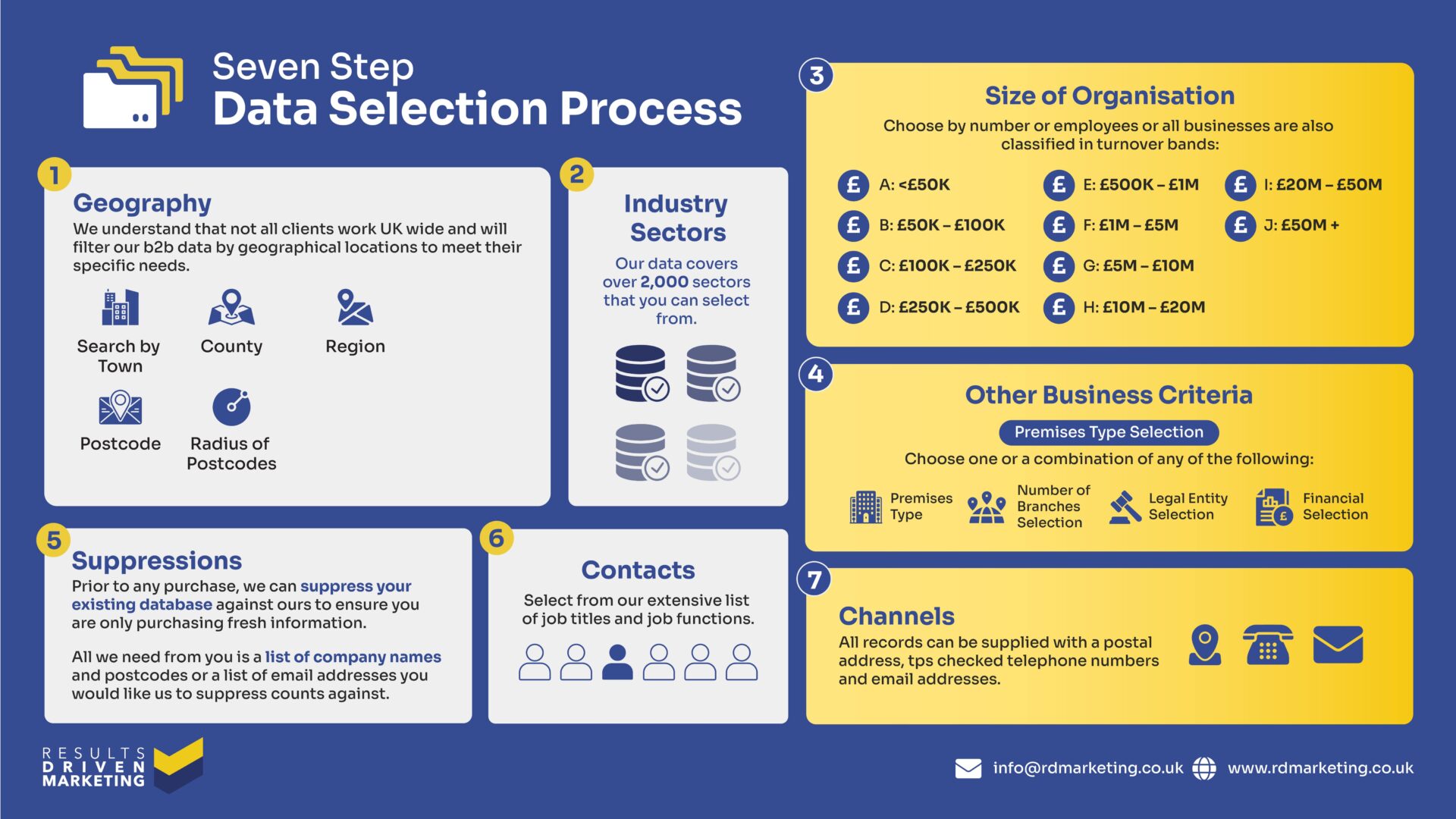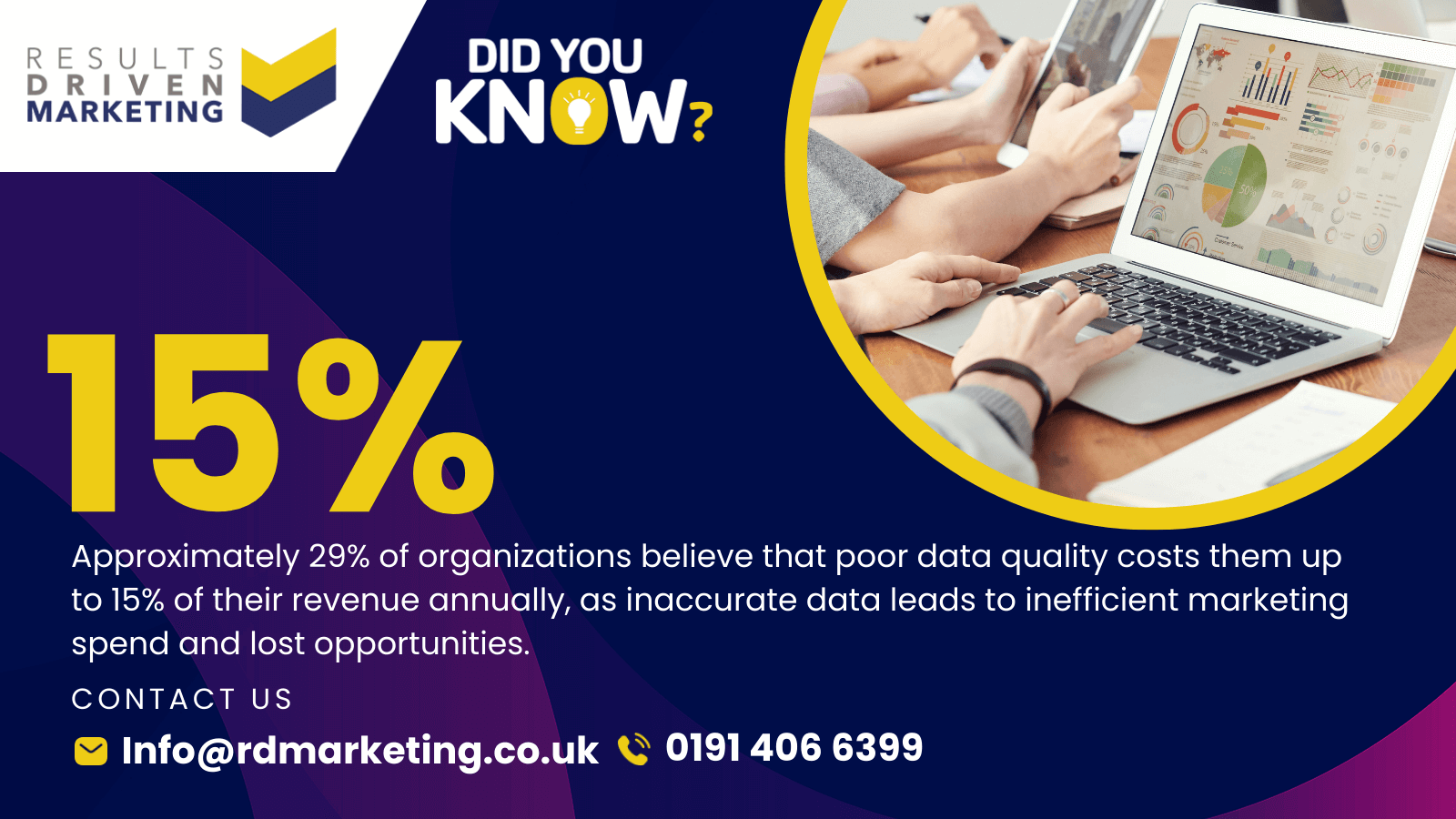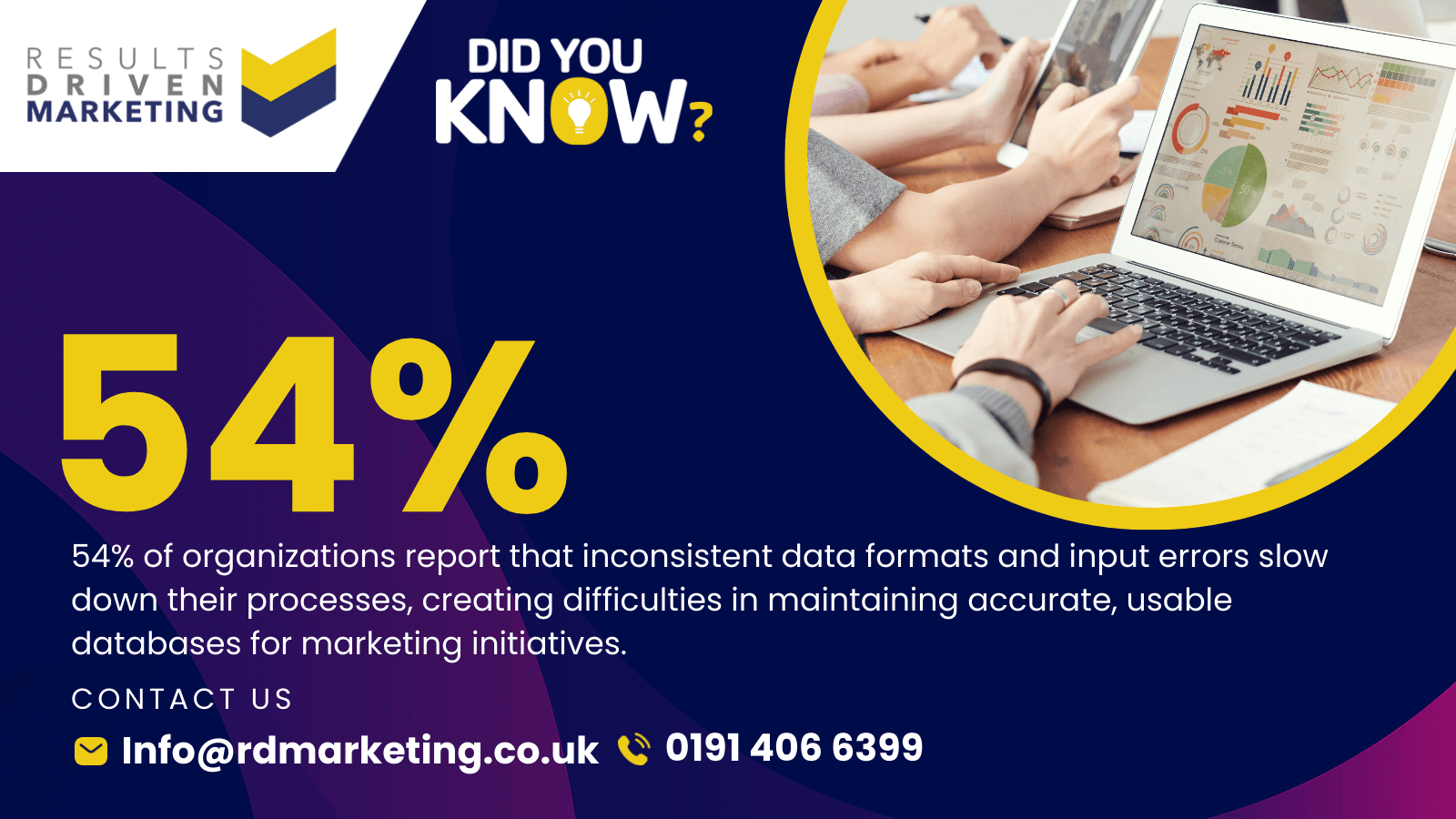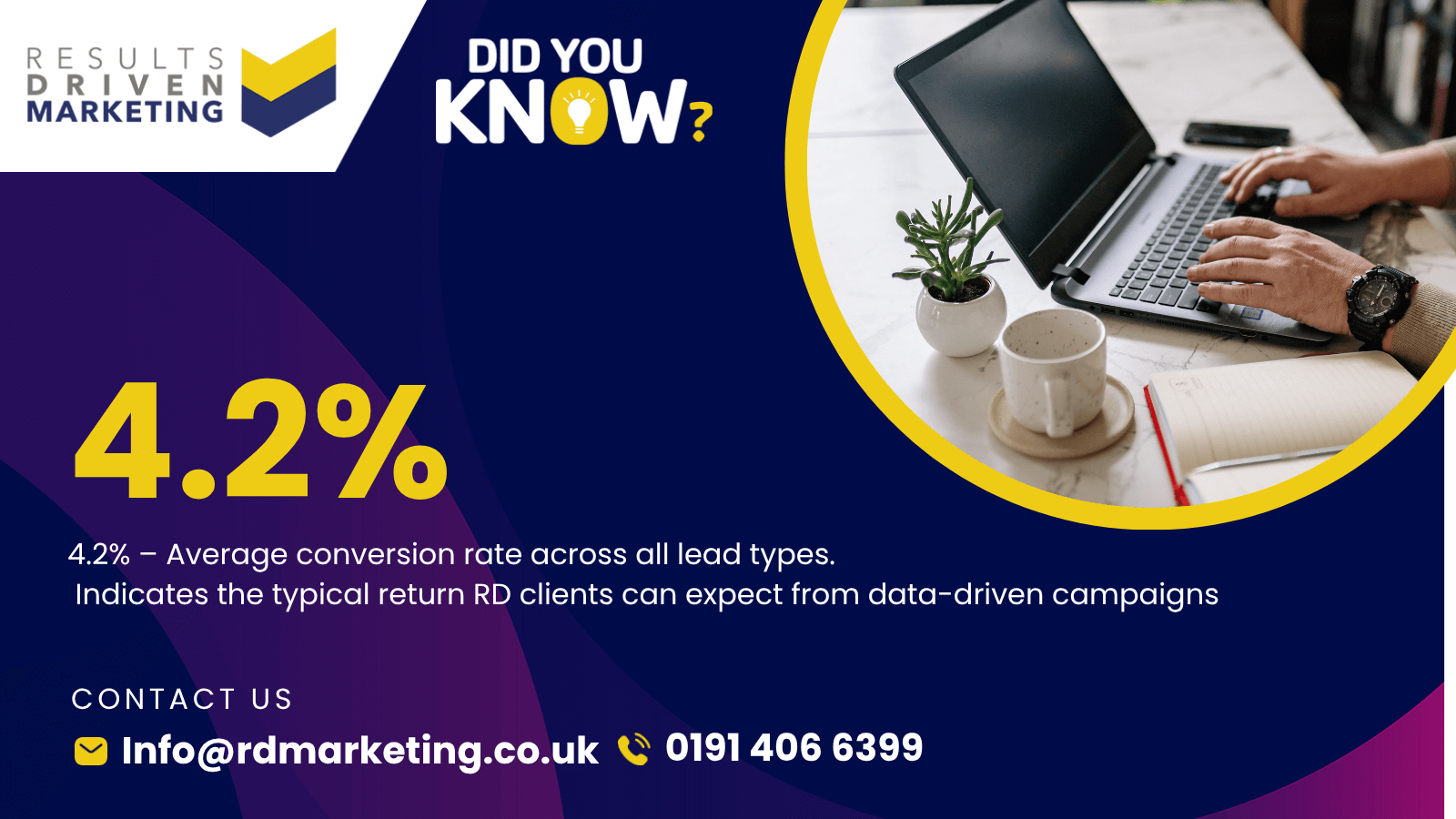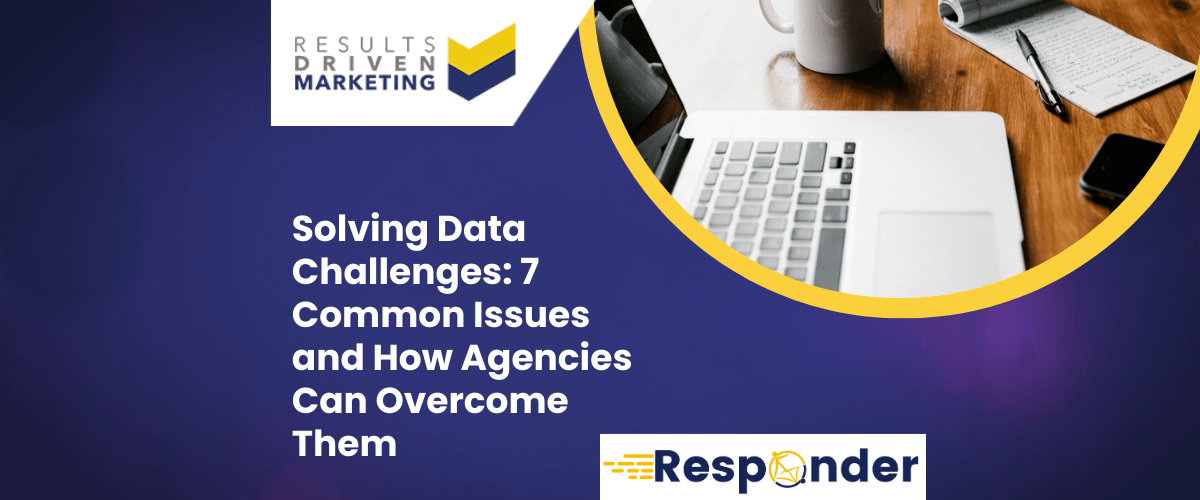
Common Data Challenges: 7 Issues and How Agencies Can Overcome Them
Common data challenges play a pivotal role in shaping the success—or failure—of marketing agencies today. Navigating these obstacles has become a critical focus for agencies striving to deliver impactful campaigns and achieve measurable results for their clients. From fragmented data to compliance issues, these challenges can disrupt workflows and hinder decision-making.
Ignoring these problems is not an option—overcoming common data challenges ensures that agencies can harness accurate, reliable, and actionable data to optimise their strategies. Whether it’s improving campaign targeting or ensuring seamless customer communication, addressing these issues is vital for staying competitive in a fast-paced market.
At RD Marketing, we recognise how complex data challenges can be. That’s why we provide a suite of solutions to simplify data management, like B2B Data for precise targeting and Direct Mail Data for effective outreach.
These services empower agencies to tackle their most pressing data concerns, ensuring their campaigns are driven by quality and consistency.
In this article, we’ll dive into seven of the most common data challenges agencies face and provide actionable strategies to overcome them. Along the way, we’ll highlight practical solutions like data cleansing services and data enrichment services that can make a real difference in your agency’s success. Stay tuned for insights that can transform the way you approach data management!
Table of contents:
What Are Marketing Data Solutions (and How to Pick the Right One)?
Marketing data solutions are the platforms, services, and processes that turn raw information into audience insight, compliant outreach, and measurable performance. Done well, they unify your sources, improve data quality, and feed every channel—email, phone, and post—with accurate, actionable records.
Core capabilities to expect
-
Acquisition & coverage: Access to up-to-date B2B datasets by sector, role, size, and location (e.g., B2B Data, Email Address List Data, Direct Mail Data, Telemarketing Data).
-
Quality & hygiene: Ongoing data cleansing to remove duplicates, bounces, and stale fields; data enrichment to append missing firmographics and decision-maker details.
-
Compliance controls: Built-in checks for GDPR/PECR and tools like a CTPS Checker to protect outbound calling and safeguard reputation.
-
Integration & portability: Simple exports (CSV/Excel) and smooth sync to CRMs/automation so teams can activate data quickly.
-
Measurement & governance: Clear accuracy guarantees, refresh cadence, and audit trails for who changed what, when.
Build vs. buy: a quick decision frame
-
Build if you have in-house analysts, legal counsel for GDPR, and engineering support for pipelines and QA—plus time to maintain sources.
-
Buy if you want speed to market, guaranteed accuracy, and proven compliance without carrying the operational load. (Most agencies and SMEs see faster ROI here.)
A 7-point evaluation checklist
-
Targeting depth: Roles, seniority, SIC, headcount, turnover, geography.
-
Freshness: How often is data verified and by whom?
-
Accuracy guarantees: Look for published SLAs (postal, phone, email).
-
Compliance model: Lawful basis, suppression handling, CTPS workflows.
-
Filters & sampling: Ability to preview counts and receive samples before purchase.
-
Licensing clarity: 12-month multi-use terms; any send limits stated plainly.
-
Support: Access to data consultants for scoping, segmentation, and campaign advice.
Implementation roadmap (fast track)
-
Define ICP & segments: Industry/SIC, role, size, location, pain points.
-
Select & filter data: Request breakdowns and samples mapped to your ICP.
-
Clean & enrich: De-dupe against your CRM; append missing fields; validate phones via CTPS.
-
Activate across channels: Launch coordinated email, phone, and direct mail sequences.
-
Measure & iterate: Track deliverability, replies, meetings, and CPA by segment; refresh quarterly.
Why agencies choose RD Marketing for marketing data solutions
RD Marketing combines targeted B2B Data with Data Cleansing, Data Enrichment, Direct Mail Data, Telemarketing Data, Email Address List Data, and compliance tools like CTPS Checker—plus hands-on advice. That means you get accurate, compliant data, delivered fast, and shaped to your brief—so campaigns perform from day one.
What Are Common Data Challenges?
In the world of marketing, common data challenges refer to the recurring obstacles agencies face while managing, analysing, and utilising data effectively. These challenges can range from handling fragmented datasets to ensuring compliance with strict privacy regulations. Left unchecked, they can disrupt campaign efficiency and lead to missed opportunities.
Let’s look at a few examples of common data challenges that agencies frequently encounter:
Data Fragmentation
When data is scattered across multiple systems, it becomes difficult to create a cohesive view of customer behavior. This fragmentation can lead to inconsistent messaging and missed insights.
Solution: Integrate your systems with tools that centralise data. Consider using data enrichment services to enhance incomplete datasets.
Poor Data Quality
Incomplete, outdated, or duplicate data can significantly reduce the effectiveness of campaigns. Poor data quality results in wasted resources and inaccurate targeting.
Solution: Regularly use data cleansing services to ensure your databases remain accurate and up-to-date.
Compliance with Data Privacy Laws
Agencies must comply with regulations like GDPR and CCPA to avoid legal issues. Failing to manage data responsibly can damage reputation and incur fines.
Solution: Tools like our CTPS Checker can help maintain compliance when conducting telemarketing campaigns.
Lack of Real-Time Data
Outdated information can limit your ability to make timely decisions. For example, targeting a lead with the wrong offer due to old data can hurt conversion rates.
Solution: Use services like our Email Address List Data for accurate and updated targeting.
By addressing these common data challenges, marketing agencies can create stronger, more effective campaigns. Our comprehensive range of solutions, including Direct Mail Data and Telemarketing Data, is designed to help agencies overcome these hurdles and achieve better results.
Turning Common Data Challenges Into Opportunities
Most agencies view common data challenges as roadblocks—but the truth is, they can become growth opportunities when tackled strategically. Poor data quality, fragmentation, and compliance risks don’t just cause wasted effort; they directly impact ROI and client trust.
How RD Marketing Helps You Overcome These Challenges
-
Data cleansing services – Eliminate duplicates, fix errors, and keep records accurate so campaigns land where they should.
-
Data enrichment services – Fill gaps in your datasets with fresh decision-maker details, turnover, industry codes, and more.
-
Compliance-first tools – With our CTPS Checker and GDPR-aligned processes, you can run outbound campaigns without risking fines.
-
Channel-ready data – From B2B Data and Email Address List Data to Telemarketing Data and Direct Mail Data, our solutions give you complete, compliant coverage.
By reframing these challenges as opportunities to tighten processes, agencies can deliver sharper targeting, reduce wasted spend, and unlock consistent campaign performance.
Challenge #1: Data Silos and Fragmentation
One of the most common data challenges marketing agencies face is the issue of data silos and fragmentation. When data is fragmented across different platforms or departments, teams miss out on having a complete, unified view of the customer.
This lack of integration prevents them from truly understanding customer behavior, purchasing patterns, and engagement levels. Without a centralised view, it becomes difficult to track leads, personalise messaging, and create targeted campaigns that resonate.
Data silos can develop for many reasons, from departmental boundaries to legacy systems that don’t “talk” to newer technology.
For example, if your telemarketing data sits in one system and your email address list data resides in another, it creates gaps in understanding customer interactions.
These gaps can lead to inconsistencies in messaging and missed opportunities for cross-channel campaigns.
Solution: Unifying Data Across Departments
To tackle the challenge of data silos, agencies can turn to several effective strategies:
- Implement Integrated CRM Systems: A centralised CRM solution can consolidate data across departments, helping teams access up-to-date information in real time. By investing in a robust CRM, agencies can ensure that sales, marketing, and customer support teams all work from the same data set. This shared access improves customer insights and aligns cross-departmental efforts.
- Adopt Cloud-Based Solutions: Cloud solutions offer flexible data storage and accessibility, making it easier for teams to work collaboratively, even if they’re in different locations. When agencies store their data in a secure cloud environment, it eliminates the physical barriers that contribute to data fragmentation.
- Consider Data Warehousing: Data warehouses act as centralised hubs for all your data, allowing you to combine various sources like direct mail data and consumer data into a single database. This unified data approach enables deeper analysis, helping your team identify trends and optimise marketing strategies based on a holistic view of your audience.
Overcoming data silos isn’t just about improving data accessibility; it’s also about enhancing customer experience by ensuring all interactions are informed by complete, consistent data.
To make this transition smoother, agencies can use RD Marketing’s data enrichment services. These services enhance your data quality, ensuring a clear, accurate picture of customer data across systems.
Visit RD Marketing to explore how our data services can help you unify fragmented data, refine targeting, and create impactful campaigns.
Challenge #2: Data Quality and Accuracy
When it comes to effective marketing, data quality and accuracy are everything. Yet, one of the most common data challenges agencies encounter is keeping their data accurate and reliable.
Inaccurate data not only disrupts marketing campaigns but also leads to poor decision-making, wasted resources, and ultimately, reduced client trust.
Imagine targeting an email campaign based on outdated email address list data or basing a strategy on flawed consumer data—the end result could be entirely off course.
Bad data can creep in from various sources: inconsistent data entry, outdated information, or even minor human errors. These inaccuracies compound over time, making it hard to rely on your data to make effective marketing decisions.
And if data errors go unchecked, they can lead to duplicate efforts, misaligned targeting, and loss of valuable insights. For agencies, this often means lost opportunities and budget waste.
Solution: Data Cleansing and Validation
Addressing data quality issues requires a consistent and proactive approach. Here’s how agencies can improve data accuracy and quality to eliminate these common data challenges:
Adopt Regular Data Cleansing Routines: Regular data cleansing services help identify and correct errors, outdated information, and duplicate records.
Services like those provided by RD Marketing allow agencies to keep data accurate and reliable, ensuring each campaign is backed by trustworthy information.
Leverage Automated Tools for Data Validation: Automating validation processes with tools that verify B2B data accuracy saves time and minimises the risk of human error.
These tools scan data for anomalies, flagging inaccuracies before they affect your campaigns.
Schedule Frequent Database Updates: A key part of maintaining data quality is updating databases frequently.
By revisiting and refreshing your direct mail data and international email list records, you ensure campaigns reach active, interested audiences. This practice helps maximise engagement and ROI.
Use Verification Services: For agencies that work with telemarketing, employing a CTPS Checker service helps ensure compliance and accuracy.
This tool validates numbers in your telemarketing data against registered consumer preferences, preventing wasted efforts and potential fines.
Keeping data accurate doesn’t just enhance operational efficiency; it builds confidence that campaigns are well-targeted, legally compliant, and optimised for results.
For agencies looking to streamline their data quality, RD Marketing offers a comprehensive suite of solutions, from data enrichment to email marketing management services that ensure your campaigns reach the right people at the right time.
Learn more about our data solutions at RD Marketing.
Challenge #3: Compliance with Data Privacy Regulations


